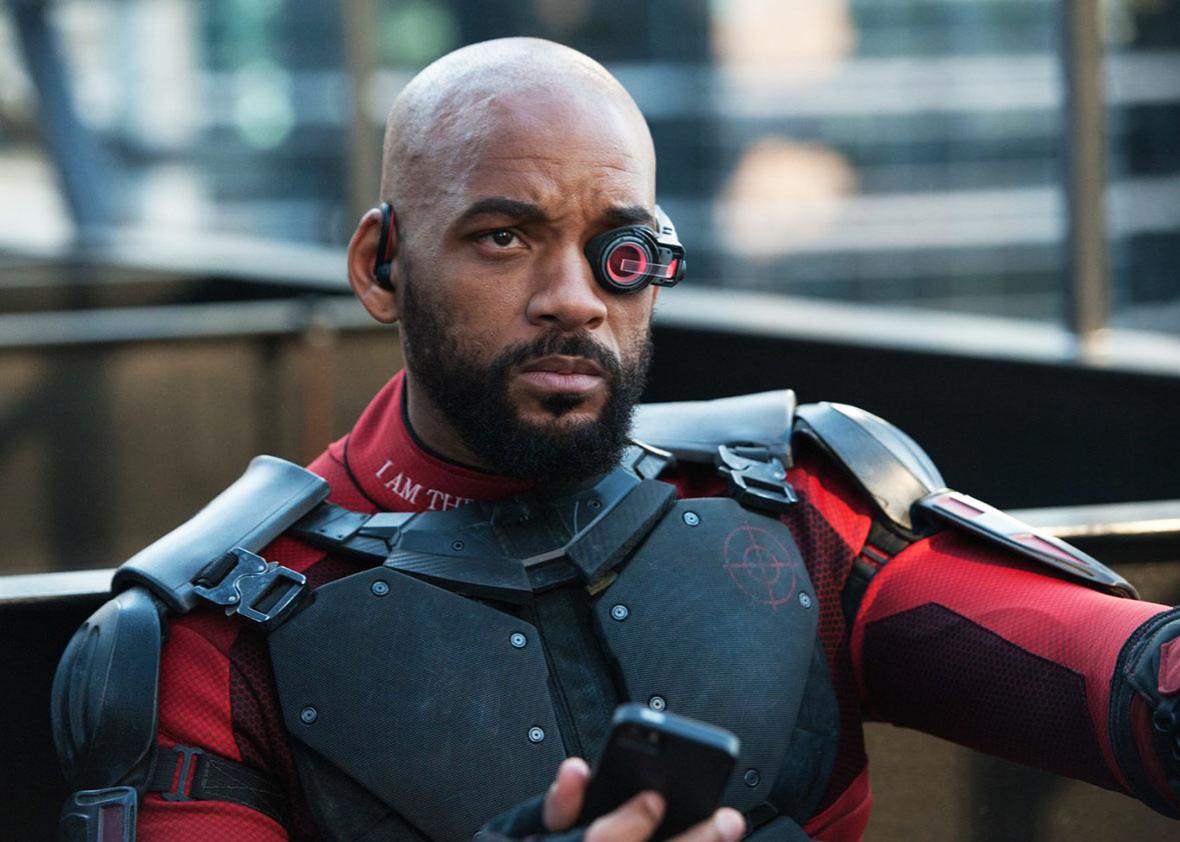Suicide Squad opens in a black site prison, and in some sense it never leaves. The film’s first half laboriously introduces us to its antiheroes, a group of assorted no-goodniks imprisoned in bespoke cells that artfully show off their respective personality disorders: Playing the seductive and deranged Harley Quinn, Margot Robbie does aerial yoga in an oversize cage; the more explicitly monstrous Killer Croc (Adewale Akinnuoye-Agbaje) swims about in the prison sewer; angry Deadshot (Will Smith) pounds away at a punching bag. A group of guards occasionally extract them from their cells to torture them. The resulting scenes are best understood as a warning, a grim signpost indicating what lies ahead for the audience itself.
If Batman and Superman are, as the saying goes, the world’s finest, the black site’s prisoners are its worst. Or so we’re told again and again. Though the film turns on the premise that only these motley malefactors can save the world, we never really get the sense that they’re especially unpleasant. Master assassin Deadshot has a bad attitude, sure, but he’s mostly a sucker for his preteen daughter. El Diablo (Jay Hernandez), a sort of bargain-bin Human Torch, has a more tragic backstory, though it inspires little more than melancholic moping for most of the film. Only Jared Leto’s overcaffeinated take on the Joker feels truly evil, though given his minimal role in Suicide Squad, much of that feels imported from other versions of the character.
As if concerned we won’t know who these people are—or why we’re rooting for them—the film delivers everyone’s biographies over and over throughout its interminable two hours. Sometimes that background comes in the form of expository monologues, sometimes by way of overwrought flashbacks. Regardless, it always feels cumbersome; no sooner have we been ever so slightly charmed by the reluctant team bonding in an abandoned bar than we’re pulled away for yet another ponderous story about someone’s dead family. If you liked the scene in Batman v Superman where Bruce Wayne watches YouTube videos of his future Justice League teammates, you’ll love Suicide Squad.
There’s a way to handle this sort of material gracefully, of course. Marvel’s Guardians of the Galaxy gathers a similar crew of unfamiliar antiheroes with considerably greater ease. It does so in part by showing them in action: As in the best superhero comics, the ways they fight (often with each other) tell us more about their personalities, passions, and peculiarities than a clumsy monologue or unearned declaration of love. Though Suicide Squad has a handful of showy action sequences—one in which Will Smith guns down a horde of monsters while standing atop a burned-out car earned dutiful applause—it’s satisfied to inform us that its characters are badasses rather than to show much actual badassery.
And for all that exposition, the film never tells us what we really need to know: Why should we care? The villain, Enchantress—an extradimensional being of untold power who has possessed the hapless June Moone (Cara Delevingne)—does a fine impression of Ghostbusters’ Gozer, but who knows what she actually wants other than the de rigueur world domination. Given that her plan (such as it is) doesn’t spring into motion until midway through the film, it’s also never wholly clear why government agent Amanda Waller (Viola Davis) is assembling the titular gang in the first place. In Superman, Christopher Reeve made us believe a man could fly; in Suicide Squad, Davis will remind you that bureaucrats sometimes just do things to stay busy.
This is all to say that the film never makes a compelling case that it needs, or even deserves, to exist. As with so many franchise pictures, Suicide Squad began as a release date on a calendar and was back-filled from there, written and directed (by David Ayer) much too quickly, according to the Hollywood Reporter. The cast is uniformly uninvested in the proceedings (except Leto, who, scores of publicity interviews remind us, bought in far too much). Even Viola Davis, an extraordinary actress, gives a shrug of a performance. Though it’s her character who coerces the gang to play along—planting bombs in their necks that explode when they rebel—Davis frequently gives the impression that she too has been forced to appear on screen. Will Smith, for his own part, will charm those who make a habit of finding Will Smith charming.
Suicide Squad’s only triumph may be that it manages to make Batman v Superman look better by comparison. Bloated and baffling as that film was, it at least had a coherent aesthetic—a morose aesthetic, to be sure, but an aesthetic all the same. Suicide Squad, by contrast, is little more than a drab patchwork, its stitching the only thing uglier than the cloth. Great action movies imbue their audiences with a sense of propulsive personal power, pulling us from one set piece to the next in ways that makes us feel like participants. Suicide Squad, by contrast, unfolds so erratically that I felt not as though I was going along for a ride but that I was, instead, trapped in my own prison cell.
